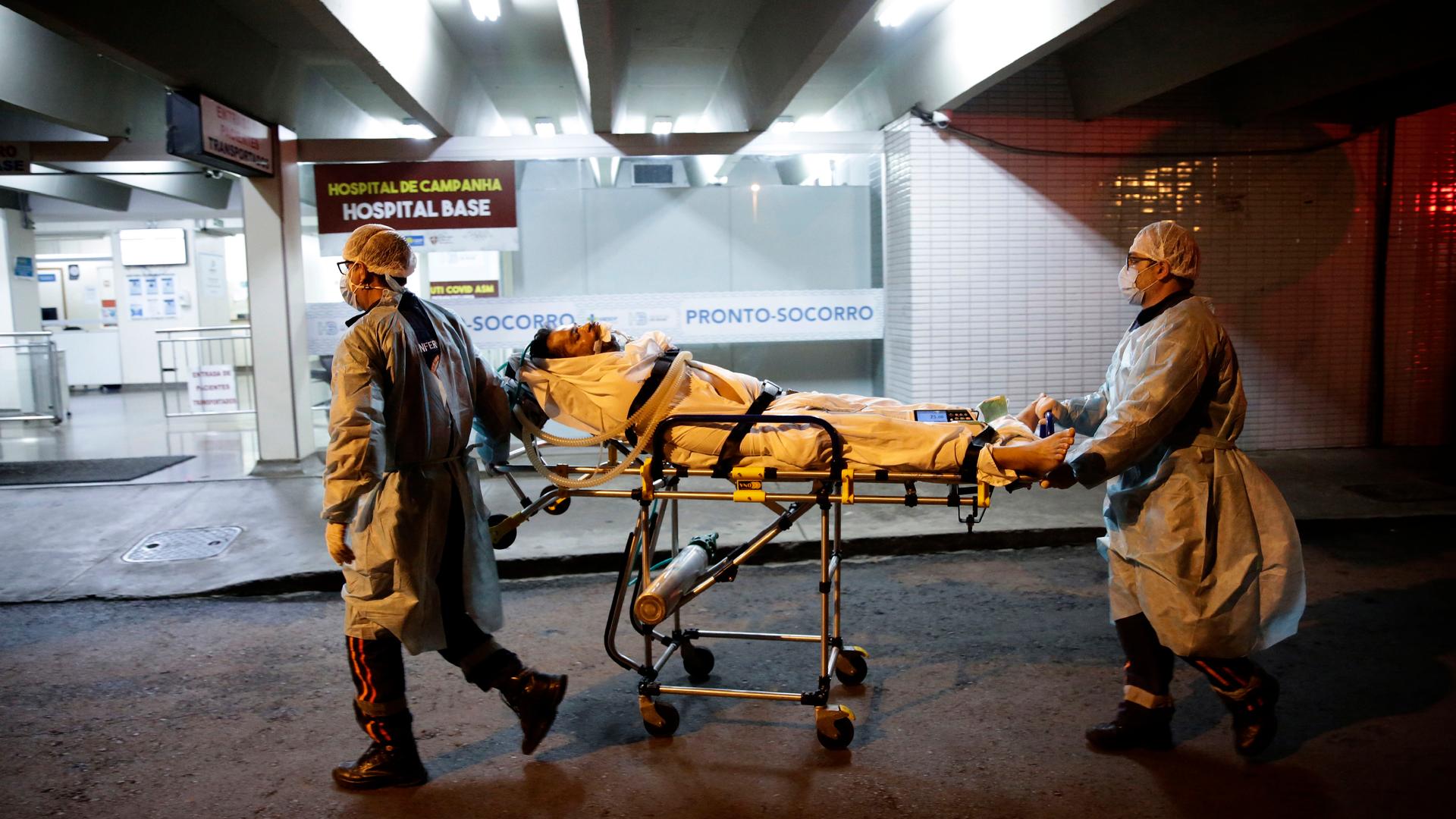Gustavo Pinto’s daily soundtrack is filled with the beeps and hums of lifesaving machines in the intensive care unit of Sao Jose Regional Hospital.
As an infectologist, he spends six days a week at the hospital located just outside of Florianopolis, Brazil.
“I can’t just stay home for longer periods, despite having a wife and a 6-year-old child because my head doesn’t turn off,” he said. “So, I prefer to come, do what needs to be done, and then go home.”
Related: Brazil’s top military commanders quit amid worsening pandemic
The number of patients at Sao Jose Regional has dropped slightly in recent days, but like hospitals across the region, it’s been bordering on collapse for weeks.
“Just to give you an idea, there was a day clinic here at the hospital where patients came to see a doctor or receive treatment that was not very complex and go home. … Today it has been converted into an ICU.”
“Just to give you an idea, there was a day clinic here at the hospital where patients came to see a doctor or receive treatment that was not very complex and go home,” Pinto said. “Today, it has been converted into an ICU.”
Health workers are deeply concerned by the gravity of illnesses of new patients.
“We did not see this in the first wave,” Pinto said. “The patients are coming in much younger, and they need much more specialized attention. You can acquire equipment, but you can’t sufficiently train professionals to deal with these complex patients in a short period of time.”
Related: Brazil saw its first COVID-19 death a year ago. It’s reached 300,000.
Hospitals across the country are facing a similar reality.
Two and a half weeks ago, the Brazilian military set up a field hospital just outside the front doors of the Restinga Hospital in Porto Alegre, the capital of Rio Grande do Sul, Brazil’s southernmost state. The region’s health infrastructure was collapsing. The hospital more than doubled its capacity, making room for 230 ICU beds.
“We never imagined a moment like this. … So bad that we might lack medicine to save lives or oxygen.”
“We never imagined a moment like this,” said Paulo Scolari, the hospital director. “So bad that we might lack medicine to save lives or oxygen.”
According to Solari, they lost 180 patients just in March.
“That number is equivalent to the number of deaths over roughly six or seven months in a normal year,” he said. “So, this really overloaded a lot of people here because death impacts you even when you’re used to it on the job … we are going to try and do a lot of work to try to help people deal with this.”
The hospital is still overcapacity, but they now have some empty beds.
“We believe that in the state of Rio Grande do Sul and in Porto Alegre, the curve is going to drop,” Scolari said. “All of the hospitals have registered less cases.”
But researchers warn not to be too optimistic, particularly just ahead of the country’s typical fall flu season.
“Right now, we are barely starting to see the number of new cases slow, with a lot of effort in recent restrictions by some states, but we are seeing increased numbers of people on the streets, and rising number of people traveling.”
“Right now, we are barely starting to see the number of new cases slow, with a lot of effort in recent restrictions by some states, but we are seeing increased numbers of people on the streets, and rising number of people traveling,” said Isaac Schrarstzhaupt, a coordinator of Brazil’s COVID-19 Analysis Network.
Some states issued tighter measures for the dayslong Easter holiday, which ended Sunday night, although President Jair Bolsonaro continues to fight lockdowns.
Last week, Brazil’s new Health Minister Marcelo Queiroga told Brazilians it was fundamental to “use a mask … and take advantage of the holiday to not get into crowds.”
But many Brazilians did not get the message.
Porto Alegre’s indoor public market was packed last Friday. In a video shared via Twitter, people are seen squeezing past each other and standing in long lines, waiting for service.
In another video, there are scenes of a packed dance party last Friday afternoon at a club in an upscale beachfront neighborhood in Florianopolis. Everyone’s holding a drink. No one is wearing a mask.
On the same day, there were more than 250 people on the waitlist for ICUs across the state.
“Every one of these holidays that promote crowds increase[s] the amount of mobility and increased mobility in areas with a lot of infections bring new cases. And those cases bring hospitalizations and deaths,” health researcher Schrarstzhaupt said.
A silver lining is Brazil’s nationwide vaccination campaign, with rates that tripled in March. Health Minister Queiroga has promised to vaccinate a million people a day throughout April.
Related: This is Brazil’s COVID-10 vaccine anthem
But vaccine shortages continue. Less than 10% of the population has received at least one shot so far.
“The fact is that there is only one way to control this epidemic,” said infectologist Pinto. “Vaccination so that everyone is immune and until you have this, social distancing.”
But Bolosnaro has avidly fought against the need for social distancing.
Last week, he called on governors to lift social restrictions.
“Only this way will get us back to normal,” he said.
The following day, he denied the seriousness of the pandemic, telling viewers in a Facebook Live that according to everything he’d heard, there was no shortage of beds in ICUs around the country.
Pinto blames Bolsonaro and local leaders for mishandling the pandemic and failing to take action to stop the spread of the virus.
“What is happening now, should not be happening,” he said. “We cannot trivialize these deaths. Every person that you lose is a loss that could have been avoided.”
